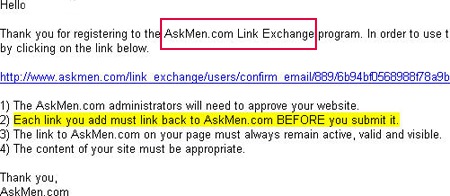Reciprocal linking is one of the most disputable SEO questions. The problem is that it is two-fold in nature. First, reciprocal links are natural being the essence of the Internet like linking overall. (So undoubtedly, we can’t do without them.) Secondly, it is the easiest way to manipulate your rankings by engaging in numerous link exchanges.
Google also gives contradicting definitions of the term:
It can provide visitors with links to other sites of a similar topic. [= reciprocal links are useful for human beings]
Reciprocal links are considered the glue that binds the World Wide Web together as they allow users to cross over between Websites, pages and documents. [= reciprocal links represent the nature of the Internet]
This is a proven way to build link popularity … [= reciprocal links can be used to unnaturally grow your link popularity]
We’ve had a plenty of discussions (one of them at SEJ by the way: “reciprocal linking and interlinking“) recently on whether reciprocal linking is worth the time, whether it can hurt and whether it is legit. We’ve also heard a few words from Googlers on that and that’s what I would like to bring up for discussion now.
John Mueller at Webmaster Groups mentioned that the violation takes place if a link was added in order to gain a reciprocal link (though I can’t imagine how this can be put into practice as no one knows another person’s intentions). He also considers reciprocal links harmful for the visitors as they might be distracted by seeing many links to alternative resources/ businesses. (which can be also up for debate).
Anyway, the two definitive points he mentions is that reciprocal links shouldn’t be numerous (“a handful”) and should be relative (“Would you hang a directory of wedding-hemed businesses up in your shop”). He also points out the social factor of exchanging links with people “people that I know really well” saying that that’s ok and natural.
Matt Cutts in his recent interview with Eric Enge also said that reciprocal links are ok as long as they are not “excessive” compared to your site other backlink sources:
if your portfolio has a very large fraction of links where you’re getting them by sending automated emails saying Did you know that exchanging links can help your rankings in search engines? That’s not a basis for fundamental long term, solid growth of your links if that’s all you are doing.
Now this brings us to two officially confirmed points:
- reciprocal links should be relevant in order to be useful, natural and hence effective;
- reciprocal links should be in minority (so focus on a couple of big players in your niche rather than wasting time exchanging links with everyone).
Another thing is that these rules are not for everyone naturally. While smaller players might be figuring if they are allowed to link back to their friends, big players will still be successfully building deep reciprocal links through their automatic link exchange program (a well known and widely discussed example is Askmen.com):


